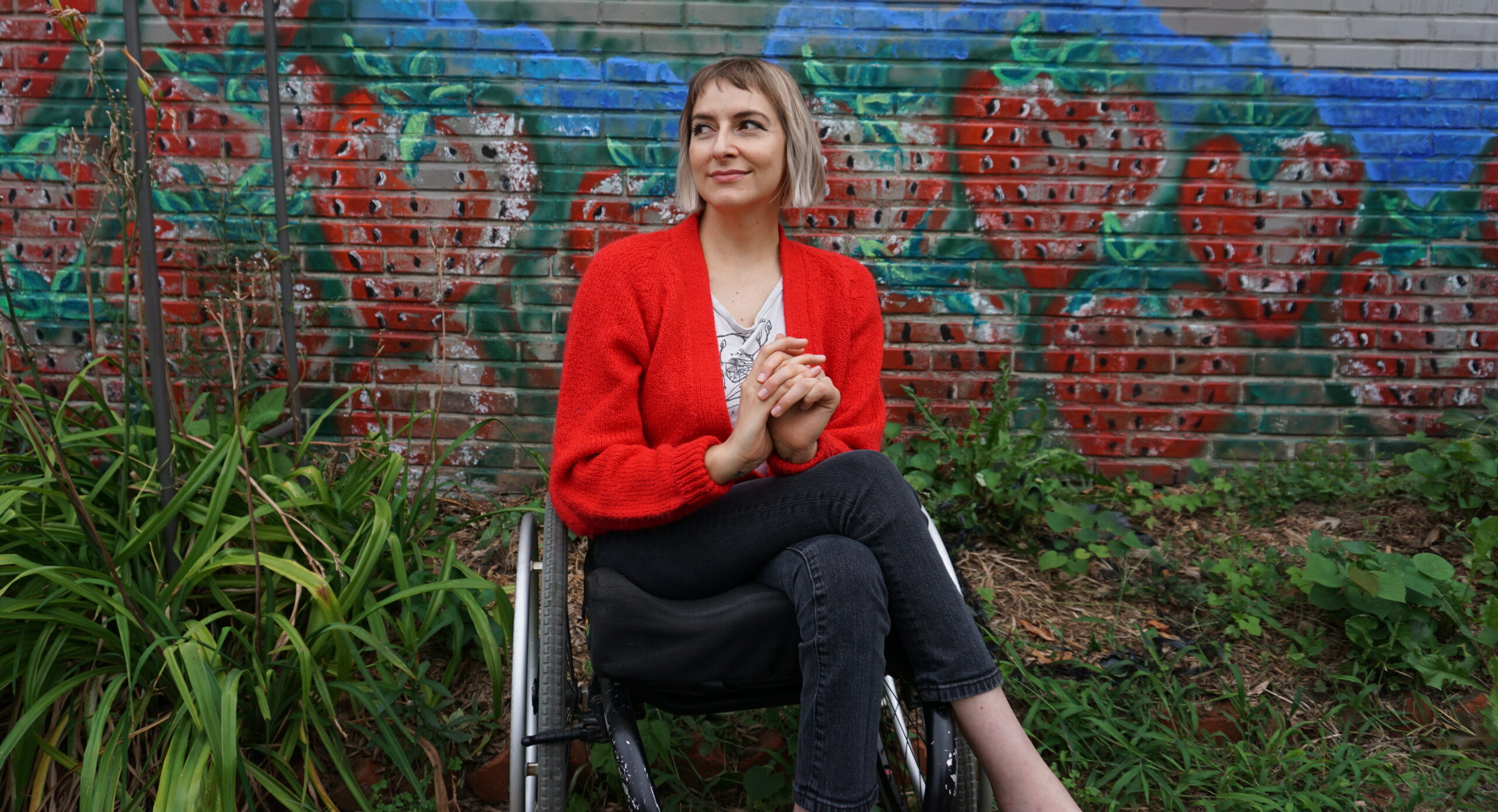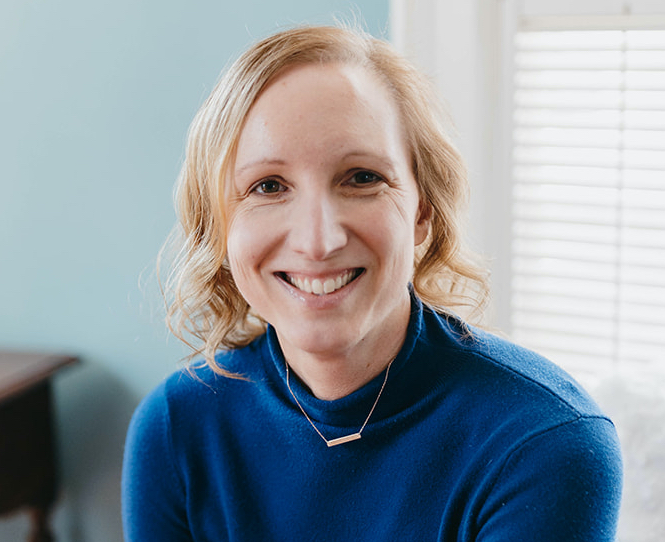Author of this year’s ‘Big Read’ book says stories help people make sense of chaos, contradictions built into life

The cool thing about life storytelling is it often takes me in unexpected directions.
I recently partnered with the Quincy Public Library for its “Big Read” event. One thousand copies of the book “Sitting Pretty,” written by Rebekah Taussig, are available for free to people living in the Quincy community. If you do not live in Quincy, you can order the book here: Order Sitting Pretty.
Taussig’s book is a series of essays and stories about her life living with a disability and her advocacy for disability. She illustrates how all of us are affected by disability at some point in our lives.
After reading the book, I reached out to Taussig to get a more insight into what she hoped to accomplish when she published it.
Q: After reading “Sitting Pretty,” what struck me was the range of emotions I felt as I journeyed through the pages. Many times, I related to how you felt through your life stories, appreciated your humor and direct communication style. At the same time, I often questioned myself and how I view and treat the disabled community. It hit me time and time again that I needed to view my world through a different lens. When you concepted this book, what were you hoping to achieve? What did you hope to be the outcome for the reader?
A: At the heart of it, I wanted readers to experience the world – in all of its textures and tones and hues, all of its fullness and contradiction – from one very specific point of view. I hoped readers could find a portal to another human’s universe. I deeply believe stories change us. They help us understand ourselves and other people. My hope was that I could tell a story that invited readers in and did the work that stories have been known to do – deepen and widen us.
I knew I didn’t want to write a book that was only for disabled readers or only for nondisabled readers. My belief is anyone can connect with a story that lays bare its humanity. As I wrote, I tried to focus on writing a full, true story. Obviously, there are readers who don’t connect with this book. But it’s a book that extends an invitation to anyone willing to read. There are no prerequisites.
Q: You often wrote about how people want to “fix you” or “pray for you.” Your essay on kindness brings so many things to light. If someone could gain one key takeaway about what kindness really looks like, what would it be?
A: When it comes to kindness, the big-picture takeaway I want to emphasize is the need to really look at each other – to take a beat before we speak or act, to listen to and believe each other. As a visibly disabled person, I’ve been on the receiving end of a lot of knee-jerk reactions – impulses to “help” that actually turn me into a spectacle or make things more difficult. On the flip side, I’ve also heard from folks with invisible disabilities who are met with skepticism when they try to express their needs, because they don’t look disabled.
Either way, the point is our assumptions are often wrong. We are different from each other in many ways. Even our attempts to imagine what it must feel like to be another person (e.g. “If I were in a wheelchair, I would want someone to carry my groceries for me!) are often misguided. We simply do not know what it is like to be another person. So we need to take a beat – look, listen, honor other people’s experiences. There are so many ways to move through the world.
Q: One of my favorite quotes from your book is, “This is a wild emancipation I wish for all of us. A world where we are all free to be, move, to exist in our bodies without shame. A world that isn’t interested in making all of its humans operate in the exact same way. A world that instead strives to invite more, include more, imagine more.”
The wonderful thing about this concept is that everyone can relate to it. Your book shines the light on how we want to put everything in a neat little box with a nice, typed label and say with a shrug of our shoulders, “That is just how it has always been done.” What do you hope readers will see by the end of your book? Do you hope their view on the world will change?
A: I do think reading stories changes us, whether that’s showing us something new or finding language to describe something we’ve always felt deeply but couldn’t name. Hopefully this book offers many opportunities for these kinds of shifts and movements.
If I could name some that are dear to my heart, they might be: disability is part of the human experience, full of just as much and little triumph and tragedy as any other human; access is a conversation for every human who has a body; cutting off disability from the center of our stories/culture/designs leaves all of us less equipped for the ride we’re already on. Said another way, disability invites imagination and innovation. To name a few, ha ha!
Q: Another aspect of this “Big Read” event is encouraging those in our community to share their life experiences. For people who want to share their life experiences through storytelling, do you have any suggestions on how they can get started? People often jump to the assumption that their life doesn’t matter. What encouragement would you offer to communicate that they do have value and purpose?
A: I love this question! I feel so deeply that all of our stories matter. Being a human is wild. Life is hard and hilarious, and stories help us make sense of the chaos and contradictions built into life. There are as many stories to be told as there are humans here. Each slant is a part of the whole. Simply bearing witness to what you’ve seen, felt, heard, tasted, smelled is a dispatch to the rest of us.
When it comes to writing stories, we’ve created a deeply hierarchical setup which says that unless you publish your stories, they do not matter. This is not true. The impulse to tell and listen to stories has been in us long before the printing press, and many gorgeous, important and poignant stories have been written without ever being published. Write your stories (or record them in your voice memos or paint them onto construction paper while your toddler scribbles at your side) freely and boldly – this is your birthright. It sounds so dramatic, but I don’t even care, because it’s true, so true, entirely true.
Even if you are the only person who reads it, that story matters. I’ve written so many things that I have never shared with another human, let alone published. I don’t see any of that as a waste. If you want, share your stories with your children, your partner, your friends, other writers, the side of a bathroom stall, people on the internet, an agent, an editor – whoever you want. That can be a beautiful thing, too.
The bottom line is we need to release stories from the pressure of what they become after we write them. Let them be silly, heartbreaking, profound, mundane, honest, but let them live.

Maureen Klues writes occasionally for Muddy River News. She recently started Memoirs by Maureen in the Quincy area. She will capture the story of an event, a story of one’s life or create a tribute for a person and put it together in a storybook format.
Miss Clipping Out Stories to Save for Later?
Click the Purchase Story button below to order a print of this story. We will print it for you on matte photo paper to keep forever.

